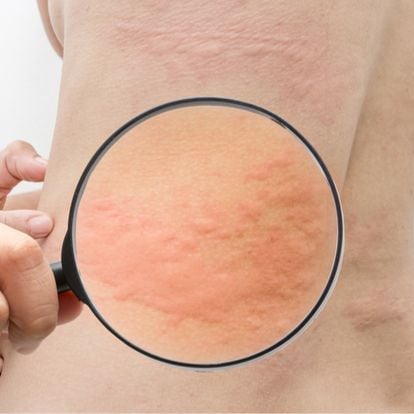
Urticaria is the medical term for hives - a common skin rash which presents with itchy pink welts. The welts can vary in size, shape, and distribution. A defining characteristic is that the individual lesions are transient, appearing and resolving within a 24 hour period. So, even though an individual may suffer from hives for weeks or even months, each welt will resolve within the timeframe of a day, only for new lesions to appear in its place.
Urticaria can be classified as acute (lasting less than 6 weeks) or chronic (lasting more than 6 weeks). Acute urticaria is commonly caused by infections, foods, medications, or insect stings/bites. Chronic urticaria is mainly idiopathic, meaning the cause is unknown. In some people, certain physical stimuli such as heat, cold, exercise, sun exposure, or pressure can induce hives. Treatments include avoiding triggers and/or allergens and the use of antihistamines (either over the counter or by prescription). For severe or recalcitrant cases, oral prednisone and other immune modulating medications may be used.
Disclaimer:
The information on this website is provided for educational and information purposes only and is not medical advice. Always consult with a licensed medical provider and follow their recommendations regardless of what you read on this website. If you think you are having a medical emergency, dial 911 or go to the nearest emergency room. Links to other third-party websites are provided for your convenience only. If you decide to access any of the third-party websites, you do so entirely at your own risk and subject to the terms of use for those websites. Neither Davidson Dermatology, nor any contributor to this website, makes any representation, express or implied, regarding the information provided on this website or any information you may access on a third-party website using a link. Use of this website does not establish a doctor-patient relationship. If you would like to request an appointment with a health care provider, please call our office at (843) 216-3376.



